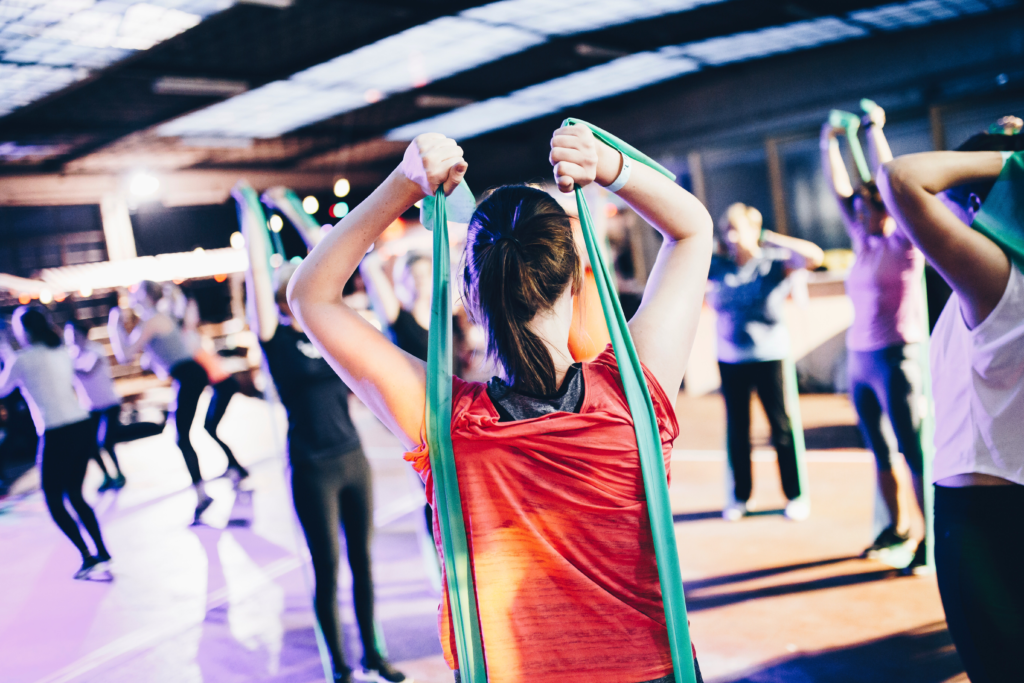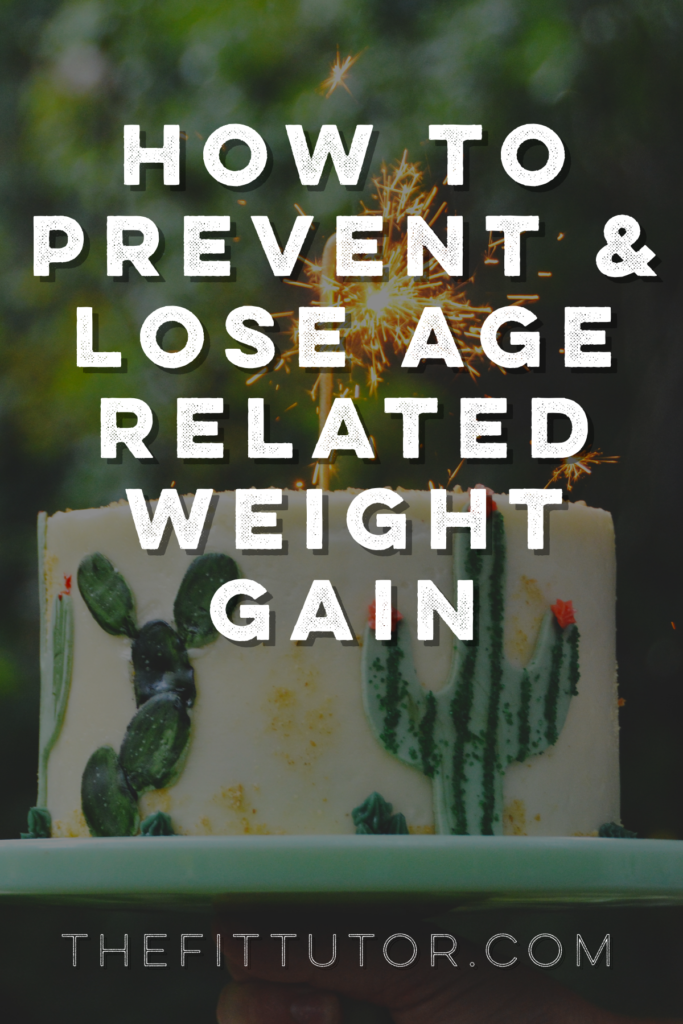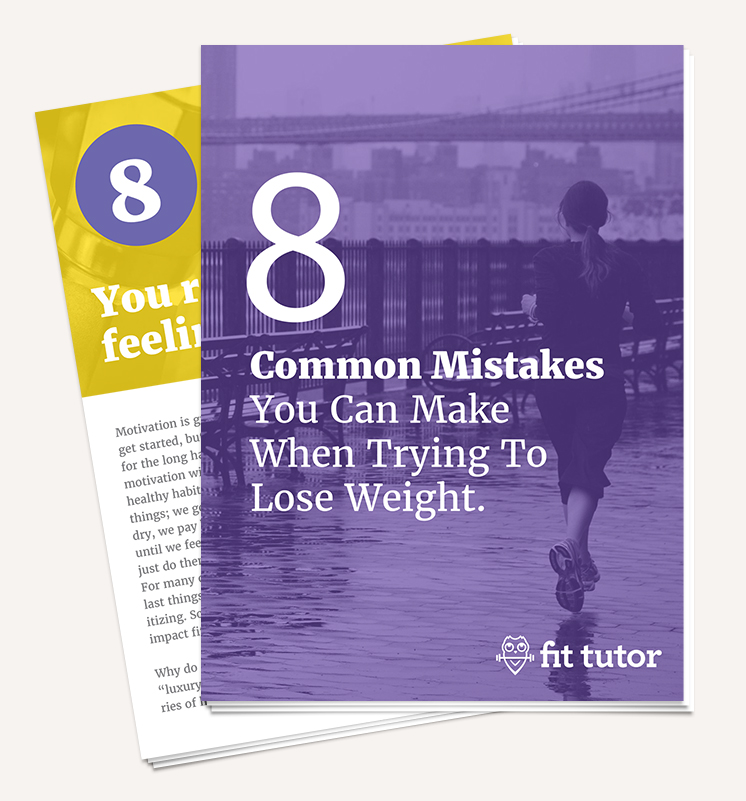Is age related weight gain inevitable? It’s all-too-common to put on a few pounds as you get older. We blame our age and slowing metabolism, but how much credit do they really deserve? This post explores how age related weight gain is real- and what’s really to blame. We’ll also dive into how you can fight it! The great news is that a few lifestyle tweaks can help you prevent and lose any extra pounds.
Why should you care? If you’re not as concerned about your pants getting tighter or looking a certain way, there are still plenty of reasons why you should be concerned. Being overweight is associated with an increased risk of metabolic disease, type II diabetes, certain cancers, and several lifestyle diseases. And as you age, you might not bounce back from illness like you did when you were younger. By making the effort to combat age-related weight gain, you’ll reduce your risk of these diseases while improving your quality of life!
What Causes Age Related Weight Gain
On average people lose 3-5% of their muscle each decade after 30. In fact, it’s estimated most men will lose 30% of their muscle mass over the course of their lives.
Ooof.
To top it off, people tend to gain 7-15 pounds on their journey to 40. Does this have to be the case? Is this just part of life? Let’s dive into the causes.
Sarcopenia: Losing Muscle as You Age
If we slowly lose muscle every year after we hit the big 3-0, this loss can affect our metabolism. Muscle uses more energy than fat, so losing muscle will naturally slow down your calorie burn throughout the day. Usually as your muscle decreases, your fat increases.
Eventually this muscle loss can take a toll on your overall activity levels, since it decreases your mobility and increases weakness. Things that used to be easy might be harder or require assistance. Decreasing your activity levels will also decrease your metabolic activity, leading to weight gain.
When your metabolism is no longer the same but you eat the same amount of foods as you used to, weight gain is inevitable.
Changes in Fat Storage
As if good ol’ wrinkles weren’t enough, you also tend to experience a shift in fat storage as you age, from subcataneous (under the skin) to visceral. Visceral fat is the dangerous belly fat that surrounds your organs. Having more visceral fat can significantly increase your disease risk. It also increases inflammation in your body, which in turn affects hormones and promotes fat storage.
Insulin Resistance
Both the loss of muscle and fat gain lead to a decrease in your body’s sensitivity to insulin. Insulin resistance, even in its early stages, can contribute to an increase in blood sugar and promote fat storage. It also increases your risk for metabolic syndrome and Type II Diabetes.
Sometimes this change can just happen because of age. Over time, our muscle cells can just lose sensitivity to insulin…. which means we should take the suggestions in the “Prevention” section to heart.
Change in Hormones
… and all the menopausal women said, “Amen.”
Although menopause deserves its own post, you’ll see some tips for handling weight gain in menopause in the exercise section – and the entire food section will be helpful for you as well.
Aging, even in those early decades, is linked with a change in hormones that can affect your weight gain and muscle mass, like growth hormone, testosterone, and estrogen. Changes in hormones can affect sleep, mood, appetite, fat storage, and muscle growth (or lack of).
As you can see, our hormones can contribute to that muffin top! However, don’t throw your hands up in dismay and reach for the Twinkies just yet – you’re not doomed! There’s still hope.
Cause or Effect?
The biggest problem with all the research is that no one knows if these are causes of age related weight gain or consequences of a change in lifestyle. It’s no secret that most people become more sedentary as they age, and the typical American diet isn’t necessarily health food, either.
This could actually be the news you were looking for. All the things mentioned that are contributing to your tight pants are also linked with a lack of exercise and a poor diet. Some experts go so far to say that although the decrease in your metabolism is real, it’s not enough to cause this much weight gain — and that lifestyle is really to blame.
Although I think the answer depends on the individual, I can tell you the solution to preventing and losing this age related weight gain is 100% related to lifestyle modifications!
And it works!
How to Prevent and Lose Age Related Weight Gain with Exercise
Whether the pounds have already creeped on or you just celebrated your 30th birthday, these tips will help you look and feel healthy!

Strength Training for the Win
Experts suggest you should strength train at least two times per week. And don’t be afraid to lift heavy! Here’s a good rule of thumb if you’re new to lifting weights: pick a weight that gets heavy and hard to do by your 12th rep. When that weight is easy by 12-15 reps, then choose a heavier one.
If you’re intimidated by weights, try out resistance bands or tubes. The key is adding some resistance.
Strength training is one of the best things you can do as you get older and wiser! It’s a top way to avoid putting on the pounds as you age.
It Increases Your Metabolism
Like we addressed, your metabolism is slowing down after 30, and part of the reason is that you’re losing muscle. So naturally, gaining muscle should increase your metabolism.
Muscle burns more calories during the day than fat, but that alone probably won’t make you fit into your favorite pair of pants you’ve been holding on to. The act of strength training will burn calories, your muscles repairing after your workout will burn even more calories, and then you can add in that little daily metabolic boost of just having more muscle! It will make a difference.
Being stronger helps make daily tasks easier, usually makes people more active in general because they feel capable. It can help ensure your independence as you age.
Cardio, stretching, or (certain types of) yoga alone will not do this. Strength training is crucial to add to your routine as you age! Spoilers! It’s also super empowering.
It Fights Fat Storage
As if you weren’t already convinced, new research is showing that you don’t need to be considered overweight to be at risk for insulin resistance and metabolic disease. Lack of muscle alone can contribute.
Since our muscle cells don’t function as efficiently as we age, they may need a little help responding to insulin like they used to. Strength training will help your cells respond to insulin, reduce fat storage, and keep your blood sugar levels normal.
It Can Help Menopausal Women, too
While we’re at it, menopause is usually a time where women gain weight and experience this shift to visceral fat and insulin resistance. Strength training before and during menopause is a great way to fight these things. Plus, it’s one of the best ways to increase your bone density and fight osteoporosis!
Cardio and HIIT
To really increase your calories burned to boost fat loss, add cardio and HIIT (high intensity interval training) to your weekly routine. These are both great ways to increase heart rate and improve heart health! Cardio and movement can help keep you mobile, flexible, and strong, and can also help promote sensitivity to insulin.
HIIT means incorporating faster intervals to increase your heart rate and breathing rate for shorter periods of time. It could be doing plyometrics for 40 seconds and resting for 20 seconds for a workout lasting 20 minutes. It could also be going on a run or walk and increasing your speed every other minute. There’s a million different ways to make intervals work for your current level of fitness.
By incorporating HIIT into your life, you get to take advantage of the greatness of EPOC – excess post-exercise oxygen consumption. This is a technical way of saying your calorie burn increases long after your intervals are over!
If You’re Already Active…
Research shows that age-related weight gain is coming for everyone, even for those of us who are active. I know, I feel your pain. However, it also shows that you can defeat this foe by stepping up your workouts a notch.
You can increase exercise intensity, duration, and/or increase the weight you’re lifting periodically to help prevent age related weight gain. You can also follow the dietary suggestions in the following section to help!
How to Prevent and Lose Age Related Weight Gain with Food
If you’re thinking about age related weight gain, then we know the days of eating what you want and never gaining a pound (if you were ever lucky enough to experience that) are looooong gone. Food choices can significantly impact the number you see on the scale, and you’re probably not as successful at “working off” a splurge as you used to be. I feel you; you are not alone.
By making better food choices and changing up what you eat and when, you can help keep the weight off or lose any pounds you may have already put on. I will agree that diet is more important that exercise for weight loss in general, but if you’re over 30, you’ll need exercise to prevent muscle loss and keep your cells using insulin properly.
Controlled Carbs
I’m not really into the low-carb craze, and I will not work with a client on Keto (unless doctor ordered), but controlled carbs?
That’s the sweet spot.
If you want to lose weight and keep your muscle cells working properly and responding to insulin, most of you will probably need to decrease your carb consumption.
Controlled carbs means you can have carbohydrate rich foods, but only with portion control. I’d suggest having one cupped handful of a carb-rich food with each meal. Choosing real food, like sweet potatoes, over simple or processed carbohydrates, like white pasta or sugary desserts, is going to help you lose weight more effectively and help promote insulin sensitivity.
Adjusting for Your Body
If you have a lot of weight to lose or know your body is very stubborn when it comes to weight loss, you could limit these portions even more. You could avoid having them after 3pm, for example, or save high carbohydrate foods for after workouts only. I’d also recommend making sure you eat carbs only with other macronutrients – like combining them with fat or protein.
You can get enough carbs in through vegetables, and you can limit high carbohydrate plant sources like potatoes, bananas, and rice to help speed up your results.
You don’t need to eliminate carbs- they serve a purpose! But by controlling your portions, how often you eat them, and what time of day you eat them, you can lose weight more efficiently.
This post on body types will help you understand how to adjust your carb portions to get the best results:
Eat More Protein
Trends show that protein consumption tends to decrease with age. The basic recommendation for protein intake is 0.8 grams per kilogram (or around 0.36 g per pound) of body mass. This recommendation is typically for basic functioning – like replenishing cells, making hormones, and building the foundation of our blood and skin. Pretty important stuff. If you’re active, you’ll need even more than that.
Consuming enough protein will help keep your cells functioning, your immune system strong, and help your muscles grow and repair after workouts.
Protein also keeps you full, and you can find many good sources that are lean and low in calories that will fill you up! If you don’t want to track your protein intake, it’s helpful to shoot for one to two palm-sized portions of protein at each meal. You’ll also want to grab at least one snack throughout the day that is high in protein.
Eating Enough Food
Most people’s problem with weight gain is that they are overeating. As you cut your calories and alter your eating habits, you’ll need to make sure you still eat enough. Under-eating (eating well below your calorie needs) can certainly cause the scale to budge, but often times that’s muscle you’re losing, not fat. By eating enough protein as mentioned above, as well as eating plenty of veggies and controlling your carbs, you’ll help ensure your body is losing fat instead of muscle.
Hang on, friend. I’ve got some practical recommendations at the end if this feels overwhelming.
Here are some helpful posts that dive into this topic more
And while we’re at it, the scale might not be your best source of measurement. Taking before/after photos, measuring your waist and other trouble areas might help you better track your progress. If you’re getting stronger, your muscle may affect what you see on the scale.
Here’s a post that will teach you how to take body measurements:

Talk to Your Doc
Let’s be clear, you shouldn’t take internet advice without consulting your doctor. If your doctor tells you to change your diet but doesn’t give specifics, consult a nutrition professional. Each person is different, so especially if you have any pre-existing conditions, your doctor is the first person you should talk to.
Prevent and Reverse Age Related Weight Gain by Reducing Your Stress
Oh snap.
Yep, it’s true. Stress will affect your hormones, your sleep, and your appetite. It’s honestly one of the most harmful things for your health and your body. Working to reduce your stress is so important, and cannot be emphasized enough.
Although in our culture being busy and stressed are somehow dysfunctional symbols of importance, they wreak havoc on your health, your sense of well-being, and your waistline. Decreasing stress can help keep your body from adding visceral fat.
How you do this is personal, but I’d suggest limiting your social media, carving out some time for rest and play in your schedule, quitting something, meditating, spirituality, exercise, changing your mindset, forgiving someone, the list goes on. Perhaps start with a habit audit and see how you spend your time.
Get Enough Sleep
Not getting enough sleep can have the same effect on your body and hormones as stress. Research shows adults sleep less as they age, but their sleep needs remain the same as in early adulthood. Sleep deprivation signals your body to store fat – and consequently sabotages your weight loss efforts.
Putting it All Together: How to Prevent and Lose Age Related Weight Gain
So we’ve covered a lot of ground – let’s condense all of this into recommendations you can use as a game plan for moving forward!
Exercise
Start strength training 2-3 days a week.
I’d recommend a combination of HIIT/cardio and Strength Training so you’ll maximize the effectiveness of your time!
How to do that? Most Fit Tutor workouts combine plyometrics and strength, sort of like a bootcamp style workout while focusing on strength gain and fat loss. You can do them all at home or the gym, and they are adjusted for each level of exerciser.
You can also work out on the machines at the gym and do jumping jacks in between, or hit up the elliptical trainer for intervals after your strength training! If you’re brand new to free weights, I’d suggest hiring a trainer to get you started! Bootcamp style classes at your local gym should be a good place to start, too.
Add in any other exercise you enjoy to your week, like cardio, yoga, sports, etc!
Move More
Yes to exercise, but just moving more in your regular life will help increase your daily calories burned and fight the harmful effects of sitting.
Park far away, take quick breaks throughout your day just to get up and walk around the office or the block, try out a standing desk, space out your chores, etc. Anything that gets you up and moving more frequently!
Change How Your Plate Looks
I know that making sure you’re eating enough- but not too much, and counting grams of protein can be overwhelming. That’s why I love the hand-portion guidelines for how your plate should look at each meal.
Here’s an in depth guide to this:
And here’s the gist:
- 1-2 palm-sized portions of protein
- 1 thumb size portion of fat
- 1 cupped handful of carbs
- and 1-2 fist-sized portion of veggies on your plate at each meal
I like to visualize this as I make a soup or casserole, too.
Snacks can be whole foods, mainly based around protein or veggies.
I teach people how to do this habit by habit in my nutrition course so it’s not overwhelming and so habits are actually ingrained. We start with one habit until it’s fully formed and then work our way through all the portions week by week. And you get meal plans while you’re learning, if this feels like a lot right now!
Optional: Track Your Calories for a Week to See Exactly What You Need to Work On
Finally, you could log your calories for a week to see where you’re going wrong. I frequently encounter clients who say they are doing everything right and eating healthy, but it’s not working. Turns out they are overeating, or consuming way too many carbs- the list goes on.
The only way to really know how your current way of eating measures up is to track it! Do this in an app that will automatically track your macros, and then you can see how much protein you’re eating, or realize your fave healthy snack is actually a crazy amount of fat that’s stalling your weight loss.
Find out how to do that here:
Start Somewhere!
Although age related weight gain is coming for us all, we are not doomed! You’re not destined to replace all your clothes with bigger sizes. You can fight this. And your entire health will benefit from these strategies, not just your waistline! You should feel more energetic, think more clearly, and your body should feel and function better!
I know for some of you these changes may sound drastic. You know what, pick one and start with what seems doable. Set an alarm in your calendar to start a new habit in a few weeks, and continue until you’ve adapted a whole new healthy lifestyle. It’s doable over time, and you are not the exception- you can do this!
And if your doctor is on your back about your health, hiring someone to help make sure you do what you’ve set out to do is worth every penny.
Let me know what questions you have in the comments, or shoot me a message. Better yet, sign up for my next Fitness Challenge!



Comments are closed.